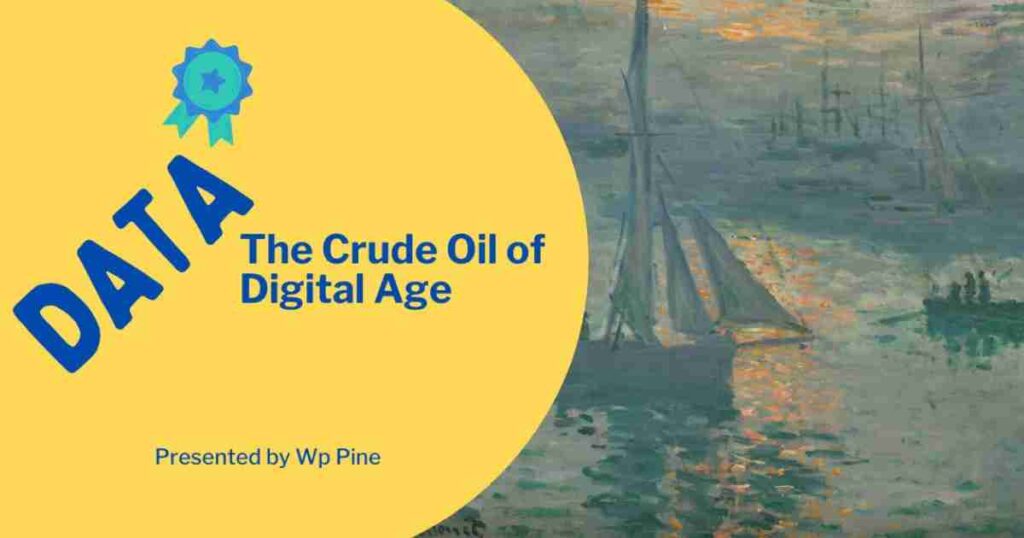Today, data is seen as the new oil, which runs down the digital veins of various organizations to power change and stimulate growth. As globalization grows faster than at any previous period in history, data has grown in importance as a fundamental resource.
In this article, we will discuss why data has been labeled the “new oil.” We delve into the daily deluge of data and the great pool being tapped for fueling advancements in artificial intelligence (AI), among other industries-from healthcare to transportation.
Data: The New Oil
Data has many traces of oil and may seem similar. However, by stepping back and thinking deeper, it becomes clear why this analogy is legitimate and revealing. Both are extremely valuable resources, but the real value in them is only unlocked after refining and processing both. Just like crude oil transforms into fuels and products that catalyze industries, raw data, when refined and analyzed, produces insights and solutions that power innovation and progress.
Here is why data is considered the “new oil”:
1. Incomparable Value:
The term “new oil” refers to how valuable data is in today’s world. Just as oil was the foundation of the industrial revolution, data has now become the basis of the digital revolution. It has become a resource fundamental for innovation and industry transformation.
Around the world, data is currently being gathered, stored with careful attention, and analyzed with utmost scrutiny. For what? To draw insights for judgments and how to run the system more efficiently. Its relevance cannot be denied because it becomes the decisive component when discussing proper business strategies, customer satisfaction, and even saving lives.
For example, the basis for predictive analytics in many organizations is data, which predicts future trends, detects potential risks and enables the design of proactive measures. From process optimization in businesses to data applied by health professionals to predict and prevent diseases, the potential is endless.
2. Economic Engine:
Much as oil was a lifeline to industrialization, data has now become the blood and life wire of the new economy. As the 21st century dawns, businesses whose loci of commerce depend on data, including those in e-commerce, social media, and financial services, are slowly, and steadily taking center stage and dominating economic activities in the world. They redefine business models drive innovation and shape global markets today.
Data is the blood that is breathed into modern business enterprises. It runs decisions, expands markets, and unlocks entrepreneurial opportunities that possibly were not conceived of even a few decades back. From job creation to encouraging innovation, data has been the bedrock of progress for the interdependent world of today.
3. Finite Nature:
Just as with oil reserves, uniqueness and a certain degree of scarcity impose limitations on the creation, capture, and storage of data. Such in-built scarcity enhances the data to an asset of pride. Today, organizations all over the world are competing aggressively to acquire and protect their share of this precious resource.
The scarcity of good, actionable data speaks for itself. Companies understand that without access to such data, there will be a strong gap in terms of innovation, improvement in decision-making, and outperformance of competitors. Pursuing data has therefore become a critical priority in the modern business landscape.
4. Refinement Parallels:
Oil offers much less value unless refined into useful byproducts such as gasoline and plastics. Raw data does the same: It holds little intrinsic value unless processed, analyzed, and interpreted. Without refinement, data is cloudy and meaningless. However effective refinement can unlock its full potential.
Data analysis and interpretation give businesses the capacity to identify trends and patterns that would otherwise appear invisible. Such knowledge allows an organization to make proper long-range projections of market demand, thereby providing adequate planning for its products. Whether designing new products or putting tailor-made services into play, it is refined data that can precisely cater to the needs and preferences of target audiences.
This makes raw data transformed into actionable intelligence, with the argument being that this moves innovation, customer satisfaction, and competitiveness in the marketplace forward in today’s dynamic marketplace.
The Expanding Data Universe
Data itself is produced daily in levels unmatched anywhere a constant and irrepressible flow, like a cosmic detonation of information. This exponential growth is fueled by two phenomena: the growing number of data sources and the unstoppable march of digitization across different sectors. The effects of these two are propelling data generation to unimaginable heights.
To gain a deep understanding of the magnitude of this phenomenon, it is important to recognize the different dimensions of data proliferation. Each passing day breeds an exponential increase in the variety, velocity, and volume of data, all of which are shaped by numerous intertwined factors:
- Data Sources: From social media interactions and IoT devices to business transactions and multimedia content, the variety of sources of data creation is vast and perpetually growing.
- Digitization: As more industries work using electronic processes instead of traditional methods, vast amounts of structured and unstructured data are emerging.
- Global Connectivity: Everyone around the globe has access to the internet, while technology is a part of everyday life, ensuring data generation is a constant and unstoppable force.
Understanding these forces of data generation emphasizes the importance of efficiently harnessing such an ever-increasing asset.
1. IoT Revolution:
With the IoT (Internet of Things) revolution, it’s almost as if the world opened the floodgates of an insurmountable tide of data. Now from smart thermostats to self-driving cars and every other connected technology in between, our devices relentlessly churn out information.
Every action they undertake feeds into this swelling tide of global data. A thermostat, for example, will keep track of temperature readings minute by minute. Motion sensors capture every movement, and smart devices log and transmit every interaction. Each message sent, each sensor triggered, and every operation executed swells the great, three-dimensional tidal wave of data.
The impact of IoT devices goes beyond individual contributions. Collectively, they create a web of interconnected data points that enable advanced analytics, real-time decision-making, and smarter systems. This surge in data generation not only expands the global data repository but also transforms industries, offering unprecedented insights and opportunities.
2. Social Media Echoes:
Social media platforms have become gigantic data factories that produce an endless stream of information every second. Millions—if not billions—of active users in the world form these platforms, which produce a vibrant mosaic of texts, images, videos, and interactions daily.
Each post, like, comment, and share forms an extensive digital footprint and leaves behind a huge trail of user activity. This gigantic network of user-generated content forms huge datasets, sometimes viewed as a goldmine full of insights ready to be tapped.
These datasets are invaluable for businesses and researchers, revealing patterns of human behavior, preferences, and trends. Companies use this data in fine-tuning the tactic of marketing, making all customer experiences better, and even predicting emerging market demands. Without proper analysis, social media data also has the power to shape decisions and transform industries.
3. E-commerce Tsunami:
Digitally, the marketplace has unleashed a tidal wave of transactional data. Through every click, search, and purchase, this precious information results. Browsing habits and detailed purchase histories are now available through companies to an immense repository of data generated by online shoppers.
This data is a strategic asset for businesses. Through it, a company can better tailor its product recommendations better to suit the preferences and choices of its customers. Marketing campaigns have become more precise and targeted. Moreover, the overall customer experience can be further optimized to be both seamless and personal through this data. End.
In the new world of digital commerce, transactional data is no longer an afterthought; it’s the lifeblood that informs strategic decision-making and innovation.
4. Healthcare and Genomic Revolution:
There is an explosion in the generation of data, and the healthcare sector is undergoing a profound transformation industry has moved from the paper era of electronic health records (EHRs) to medical imaging and genomic data, pointing the way to the data-driven age.
These datasets are revolutionizing healthcare in seemingly magical ways. Predictive analytics, driven by these vast volumes, make it possible to offer individualized patient care through predictions of future health problems and recommendations for proactive care. Electronic health records simplify diagnosis and treatment, as important patient information is made readily available to healthcare providers.
Moreover, genomic data abundance has sped up progress in genetic research. It opens up possibilities for unprecedented therapies for so-called incurable diseases. By capitalizing on genomic knowledge, healthcare professionals are now in a position to design more precise therapies, thus improving recovery chances and decreasing hospitalization and treatment expenses.
Data-driven innovation is also accelerating the discovery of drugs. Nowadays, companies rely on advanced algorithms and machine learning models to analyze vast data sets and recognize promising compounds that reduce the time spent before coming to market with new drugs.
Health care is the spearhead of this data revolution, unlocking once unimaginable levels of potential. With every innovation, the promise of curing complex diseases and improving health outcomes globally draws ever closer to reality.
Data Powers AI and Beyond
Data thus finds its real value when put to use, and nowhere do I see this better than in the field of Artificial Intelligence. AI has taken much precedent in the contemporary world, and it now redefines human perception and interaction with the world. For instance, it is through its ability to process high volumes of data that AI is changing various industries.
At its core, AI feeds on data. The more AI systems have been exposed, the more they can be great at learning, adapting, and making predictions. Anywhere from healthcare and finance to customer support, the nature and capability of AI to process large data volumes enable them to automate tasks, discover hidden insights, and move toward more intelligent decision-making.
Now, let’s take a journey into how data is fueling AI and enhancing it in various fields:
- Healthcare: Al-powered systems analyze medical data for patterns in and projections of the outcomes of health care. This fosters early detection and treatment, as well as rapidly accelerating drug discovery.
- Finance: In finance, AI analyzes historical transactions, market trends, and economic indicators to predict stock prices, detect fraud, and optimize investments.
- Retail: AI uses consumer data to predict or forecast shopping behavior, recommend personalized items, and optimize inventory management. Retailers can improve customer experience or increase sales from the insights gained.
- Transportation: Autonomous vehicles have more extensive applications of AI to execute data processed by sensors, cameras, and other GPS systems. They make appropriate responses and ensure safe navigation in complex environments in real time.
- Manufacturing: AI is optimizing production processes in terms of analyzing data inputs from the machinery, sensors, and supply chains, turning this into predictive maintenance, cuts on downtime, and operations that function better.
Appetite of AI for Data:
In many ways, if AI algorithms, and more specifically machine learning, find a home anywhere, it is in data. Large and diverse datasets form the bedrock of the training of AI models. The greater the variety and size of the data, the more sophisticated and effective the AI model. It is that data that makes it capable of detecting patterns, understanding natural language, and deciding autonomously. This makes it possible for applications that may go from the self-driving car to a virtual personal assistant.
Prediction accuracy:
Accurate forecasting is also improved through data-driven insights, enhancing contingency planning and customer service. Within such analysis, AI algorithms can spot subtle trends and patterns that may otherwise go undetected by human analysts. These help organizations make proactive decisions, putting distance in advance of potential challenges.
Personalization Revolution:
We are in the age of personalization, and data is at its core. By doing this, companies can tailor their products, services, and marketing messages according to individual tastes and preferences, improving customer satisfaction and loyalty. Examples of this kind of personalization include personalized product recommendations on e-commerce platforms and custom-curated playlists on music streaming services.
Transformation in Healthcare:
Data-driven AI technology drives a radical transformation in healthcare and changes the global landscape by enabling early-stage diseases to be detected and diagnosed and predicting patient outcomes, making drug discovery faster. The key ingredients in AI applications include patient health records, medical imaging, and genomics data—all drivers of significant advancements for both medical practice and research.
Evolution of Transport:
AI powered by big data is transforming driverless cars, just like those from Tesla, into reality in the transportation sector. It has reshaped the dynamics of public transport and optimized logistics networks. Sensor, GPS, camera-based data sources, and others are continuously processed to make road safety better, de-congest roads and optimize the efficiency of transportation systems as well.
Key Outcomes
Data has truly earned its place as the “new oil” of the digital era, with its intrinsic worth compounded by the rapid growth in data generation as an essential factor in forming our present and, more so, our future. Navigating this data-driven landscape requires us to acknowledge the enormous power involved and the responsibility associated with it.
Meanwhile, the technical prowess of data must be complemented with proper data ethics to allow its full potential to be harnessed for maximum, better benefits for society and humanity. At this point in history, data is seen as the very keystone of progress, serving as the driving force behind innovation and development. Proper and responsible application will pave the way for a brighter, more interconnected future and make possible advancements throughout many industries while opening opportunities for societal development.
Additional Resources
Dive in and discover the exciting new oil of the digital age, along with some fascinating tech trends that are shaping our world! Keep reading—there’s so much to explore!
- A Beginner Guide to Machine Learning: The Fascinating World of Machine Learning
- Take a look at the comparison: Machine Learning Vs Meta Learning Explained
- Transform Your Skills with Python – Master Programming Today
- Learn more about Python – Abdul Moeez
- Learn more about Java – by Abdul Moeez



